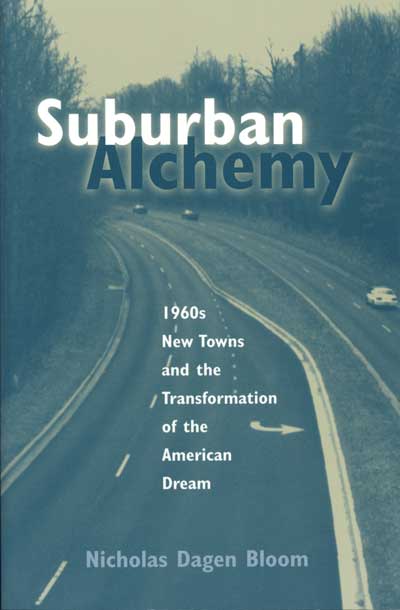
Suburban Alchemy
1960s New Towns and the Transformation of the American Dream
Nicholas Dagen Bloom
In Suburban Alchemy: 1960s New Towns and the Transformation of the American Dream, Nicholas Dagen Bloom examines the “new town” movement of the 1960s, which sought to transform the physical and social environments of American suburbs by showing that idealism could be profitable.
 Bloom offers case studies of three of the movement’s more famous examples—Reston,
Virginia; Columbia, Maryland; and Irvine, California—to flesh out his historical
account. In each case, innovative planners mixed land uses and housing
types; refined architectural, graphic, and landscape design; offered well-defined
village and town centers; and pioneered institutional planning. As Bloom
demonstrates, these efforts did not uniformly succeed, and attempts to
reshape community life through design notably faltered. However, despite
frequent disappointments and compromises, the residents have kept the new
town ideals alive for over four decades and produced a vital form of suburban
community that is far more complicated and interesting than the early vision
promoted by the town planners. Lively chapters illustrate efforts in local
politics, civic spirit, social and racial integration, feminist innovations,
and cultural sponsorship.
Bloom offers case studies of three of the movement’s more famous examples—Reston,
Virginia; Columbia, Maryland; and Irvine, California—to flesh out his historical
account. In each case, innovative planners mixed land uses and housing
types; refined architectural, graphic, and landscape design; offered well-defined
village and town centers; and pioneered institutional planning. As Bloom
demonstrates, these efforts did not uniformly succeed, and attempts to
reshape community life through design notably faltered. However, despite
frequent disappointments and compromises, the residents have kept the new
town ideals alive for over four decades and produced a vital form of suburban
community that is far more complicated and interesting than the early vision
promoted by the town planners. Lively chapters illustrate efforts in local
politics, civic spirit, social and racial integration, feminist innovations,
and cultural sponsorship.
Suburban Alchemy should be of interest to scholars of U.S. urban history, planning history, and community development, as well as the general reader interested in the development of alternative communities in the United States.
Nicholas Dagen Bloom is a visiting assistant professor of history at
Tulane University in New Orleans.
|
Jul 2001
Urban Studies/History 352 pp. 6 x 9 illus. |
|
| $29.95 paper 978-0-8142-5075-4 | Add paperback to shopping cart |
| $73.95 cloth 978-0-8142-0874-8 | Add cloth to shopping cart |
| Urban Life and Urban Landscape |


